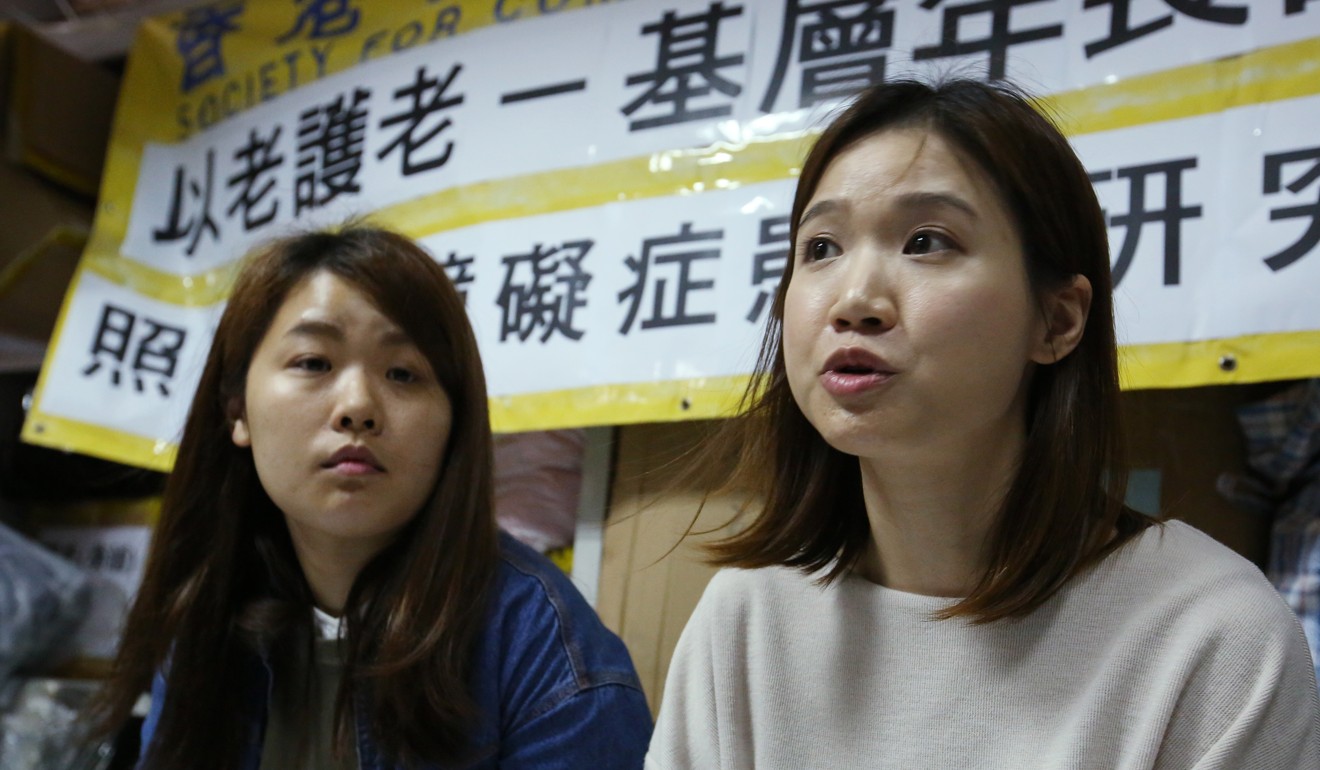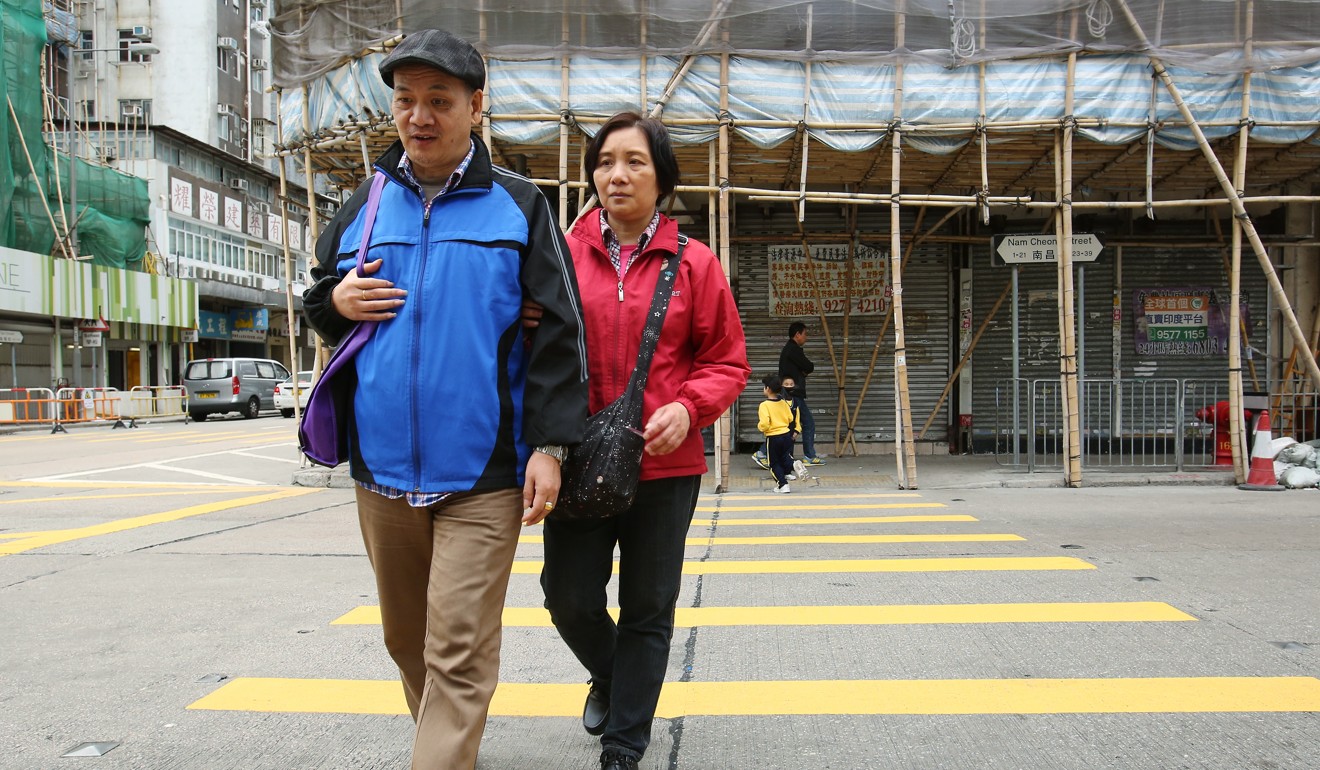
Caring for the carers: calls for Hong Kong to ease restrictions on allowance scheme
A programme designed to help low-income individuals who care for the disabled elderly fails to reach enough people because of its eligibility requirements, a social service group says
Mrs Chan choked back tears when she talked about the pressure she had been under since her husband suffered a massive stroke.
Mr Chan, 63, was forced to quit his HK$10,000-a-month job as a security guard because the stroke, which occurred in late 2015, left him with cognitive disorders that affect his ability to speak and remember things.
Things were so bad that Mrs Chan, 54, had to quit waitressing, where she earned HK$8,000 a month, to take care of her husband 24 hours a day, seven days a week.
The couple now relies on Comprehensive Social Security Assistance (CSSA) of some HK$6,000 (US$765) per month, after they burned through their savings in late 2016 paying for medical and rehabilitative services.
Ignored, overburdened and at risk of burnout – what can be done for Hong Kong’s carers?
“Our family finances collapsed after the stroke,” Mrs Chan, who only wanted to be identified by her spouse’s surname, said last week. “I wish the government could provide more financial relief for carers of the elderly, especially sick elderly, and allow us a chance to take a break and breathe.”
Despite their financial hardship, Mrs Chan is disqualified from a HK$2,000 monthly living allowance from the government’s Community Care Fund designed to help low-income caretakers of the disabled elderly, because of the money she receives from CSSA.
The Society for Community Organisation (SoCO), a social service group helping the Chans, wants that to change, and has called for officials to remove eligibility barriers and raise the fund’s allowance.
Our family finances collapsed after the stroke
SoCO also wants the fund to regularise the allowance, which was part of a pilot scheme launched in October 2016 and closed in September. It estimates as many as 190,000 Hongkongers might suffer from a cognitive disorder in the next two decades.
“We will submit our research findings and suggestions to the fund during its public consultations,” said Crystal Yuen Suk-yan, one of SoCO’s community organisers.
From December to February, Yuen conducted a study of 15 carers of elderly people with cognitive disorders, who themselves were aged between 50 and 81.
Among the 15 carers, 11 were receiving CSSA or a living allowance from the government. The cost of living and medical care was so high that some carers said they fought with loved ones over money and the sick chose not to seek treatment.

Eligibility for the allowance largely hinges on whether other forms of government assistance are being received. People receiving CSSA or an elderly living allowance are automatically disqualified.
One must also meet the income requirement based on the size of the household. A family of two, such as the Chans, must make less than HK$14,250 a month.
‘Matter of time’ before Hong Kong imports carers for elderly, labour minister says
A spokesman for the Social Welfare Department, which oversees the fund, said it had commissioned the Sau Po Centre of the University of Hong Kong to evaluate the allowance scheme. The study was expected to be completed in the third quarter of this year.
As of February, the scheme had paid out HK$316 million to 3,963 carers with 4,106 elderly residents under their care.
The scheme could ease the burden for people like Mrs Chan who struggle to make ends meet. The extra HK$2,000 a month would help her pay for her husband’s acupuncture treatments, which he gets 15 times per month at HK$150 per session, as well as HK$500 to HK$1,000 in monthly fees at the centre where he does his rehabilitation.

“The situation has been so stressful that my young [adult] daughters quarrelled with us,” said a tearful Mrs Chan. “The doctor has made it clear that acupuncture can only bring 20 to 30 per cent relief to my husband. But we have to sustain the treatment, because he might be worse off if we give up.”
Part-timers, carers, domestic helpers focus for Hong Kong’s new labour minister
Yuen suggested raising the allowance to HK$3,000 per month because the HK$2,000 was not enough to help families taking care of a person with a cognitive disorder. Yuen added that a new HK$1,500 tier should be set up for carers of people who suffer from moderate-to-medium impaired ability.
“Only with more financial support and community services will the carers be able to ease their physical and mental pressure,” Yuen said.

